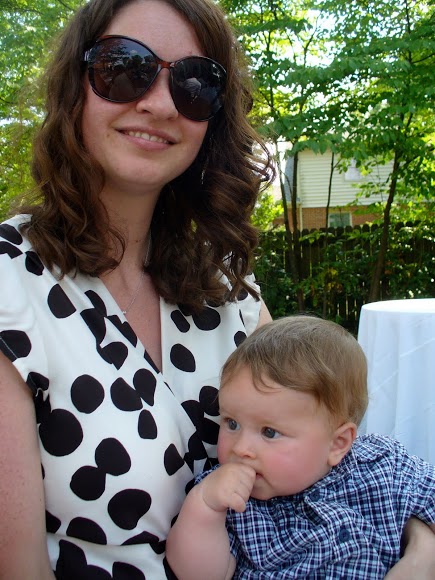By Lynne Feldman
Months before I landed in my first MotherWoman group, an anxious, exhausted, and shaken mother to a newborn, I would never have guessed that the hardest part of having a baby wouldn't be the physical pain, but the emotional pain, a double whammy of "baby blues" and grief over not succeeding in breastfeeding.
While pregnant, I read the books, took the classes, imagined all the possible scenarios through which my child could be born. I felt that if I could get through childbirth, I could get through anything, including breastfeeding. I was wrong.
 After my son Sam was born late in the evening, with the help of an epidural, I held him skin to skin. My doula, my nurses, and my husband kept encouraging me to place him at my breast, but I thought he would make his own way there, the way newborns did in the birth videos we watched in childbirth classes. He only fell asleep over and over again. So, we let him sleep, and we slept.
After my son Sam was born late in the evening, with the help of an epidural, I held him skin to skin. My doula, my nurses, and my husband kept encouraging me to place him at my breast, but I thought he would make his own way there, the way newborns did in the birth videos we watched in childbirth classes. He only fell asleep over and over again. So, we let him sleep, and we slept.
The next day, my milk came in. I knew then I could feed my baby as soon as he was ready--no worries about lack of milk. But all that day, Sam slept, and when we managed to rouse him, he couldn't latch on. The lactation consultant on call said he was having trouble latching because of engorgement, which was made worse by a case of edema, or water retention, from the IV fluids I received during labor that were a requirement of the epidural. For him, it was like trying to suck on an over-inflated balloon.
She suggested I try a breast pump to get some colostrum--the early, nutrient rich milk--for Sam. Pumping for the first time. I marveled at the few drops of yellow liquid, amazed again by my own body. The nurses mixed that eyedropper of food with some sugar water and fed it to my baby with a tiny plastic cup. Watching this I felt sad, already feeling that I'd failed somehow.
Then, the pain started. Trying again and again to nurse made my nipples tender and sore. My breasts were hard to the touch, the skin stretched and shiny. I kept nursing, determined, and I breathed through the pain. But the damage was being done.
At home, I tried again and again to feed the baby. He would latch, then fall away, and latch again a short while later, each time more painful than the last. It made my toes curl. My nipples were broken and cracked like a boxer's knuckles, and the engorgement persisted. I called the nurses at the hospital and my doula, but all they could tell me was that it would get easier soon. I cried though every feeding, breathing through the pain, terrified I would be unable to do the only thing I cared about then, the driving, chemical force controlling my maternal mind: feeding my baby.
The day before he turned 2 weeks, early in the morning hours, exhausted and weeping, with no one to turn to, I pumped breast milk and fed Sam with a bottle. I was giving up.
This is how I came to feed Sam breast milk from a bottle, exclusively, for 20 months, and also how I came to find myself at a MotherWoman support group.
At the time I arrived with my two-week-old son in my arms, my sense of hopelessness and grief had overwhelmed me. I felt guilty for not trying harder to nurse, I felt sad. I thought, how can I feel this way when my baby is healthy?
During that first support group, I found empathy, unaccompanied by the usual advice or judgment. Even the simple gesture of another mom rocking my newborn while I treated myself to coffee and a muffin (since even the most basic self-care can go by the wayside for new mothers) made me feel understood, valued, and welcomed.
From that meeting on, even though I still struggled with pumping, sleep deprivation, and other challenges faced by new moms, the hopeless feeling lifted, the crying eased, and my confidence improved day by day, over the course of my first year as a mom. I believe MotherWoman support groups prevented my postpartum emotions from getting worse, giving me and my baby a better start together.
And through MotherWoman's support network, I found an experienced childbirth educator and doula who helped me prepare for the arrival of my second child, Elliott, three years later--whom I am now nursing.
Lynne Feldman is a working mother of two boys, ages 3 and 7 months. She is Director of Marketing for a New England based education company and holds an MBA from Columbia Business School. She authors the blog Babyfood, an evidence-based search for answers to breastfeeding problems, covering her journey from bottle-feeding breast milk to nursing. http://babyfood1.blogspot.com/
Please consider supporting MotherWoman through its 'Advocating for Mothers' Campaign, which is part of Huffington Post's RaiseForWomen Challenge.
